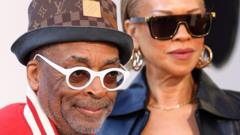Tidjane Thiam, a potential presidential candidate in Ivory Coast, faces disqualification due to a recent court ruling concerning his citizenship status. This situation, reflecting deep-seated issues of identity politics in the country, highlights concerns over democratic engagement amidst a backdrop of popular discontent and potential political unrest.
Ivory Coast's Political Identity Crisis: The Implications for Democracy

Ivory Coast's Political Identity Crisis: The Implications for Democracy
A legal ruling threatens to sideline exiled Ivorian politician Tidjane Thiam from the presidential race, posing questions on the health of democracy in Ivory Coast.
In an unexpected turn of events, the political ambitions of Tidjane Thiam, a prominent figure in Ivorian politics and the Democratic Party of Ivory Coast (PDCI), are jeopardized following a court's ruling that he is ineligible for the upcoming presidential election. This milestone could be perceived both as a reflection and a catalyst of fading democratic practices and national identity issues in the country often celebrated for its cocoa production and rich footballing talent.
Thiam, who spent over twenty years building a career in global finance, was recently re-established as a significant contender in the race after being named the PDCI candidate on April 17, 2023. However, a ruling on April 22 has cast a pall over his aspirations. The judge's decision, based on an antiquated law regarding dual nationality, determined that Thiam forfeited his Ivorian citizenship decades ago upon acquiring French nationality—an assertion his legal team vehemently argues against.
Having returned to his homeland in 2022, Thiam was initially recognized as a strong candidate to succeed President Alassane Ouattara, who, having served three terms, may be poised to run again at 83. The PDCI’s historical and influential status in Ivorian politics made Thiam an ideal alternative, especially following the death of influential leader Henri Konan Bédié. The anticipated election is crucial, not just for the immediate political landscape, but for the national psyche given the country's past turmoil linked to identity politics that splintered the nation during the late 20th century.
As the political environment deteriorates, with only a handful of viable candidates facing exclusion due to court battles, many Ivoirians find themselves disenchanted with the political establishment. This disillusionment is also reflective of a broader regional sentiment in West Africa, where military coups in Mali, Burkina Faso, and Niger have emboldened anti-establishment rhetoric among the youth—approximately 75% of the population is under 35.
The current situation unveils troubling parallels with a historical context where identity and governance intertwined destructively—particularly through the controversial "ivoirité" law, which previously barred eligible candidates based on perceived foreign roots. The court's ruling against Thiam reopens discussions around these identity issues that have haunted Ivorians for decades, reminiscent of a time when political allegiance was intricately tied to ethnicity and national identity.
Thiam remains publicly resolute, asserting his Ivorian birthright, and drawing a striking analogy to the national football team, questioning if the country would return its recently acquired Africa Cup of Nations title—or its entire team—due to the players’ dual nationalities. Despite the pressure and growing debate over his potential exclusion, there still exist hopes that political negotiations may pave a path for Thiam’s reinstatement as a candidate.
As the October elections draw closer, the implications of this political debacle extend beyond individual candidacies, reflecting on state unity, national identity, and the integrity of Ivory Coast’s democratic aspirations. With significant external and internal scrutiny, the outcome of this ordeal may resonate deeply within the broader landscape of West African politics.


















